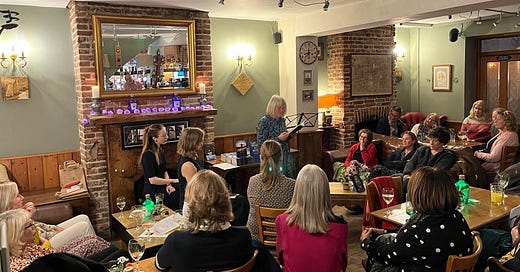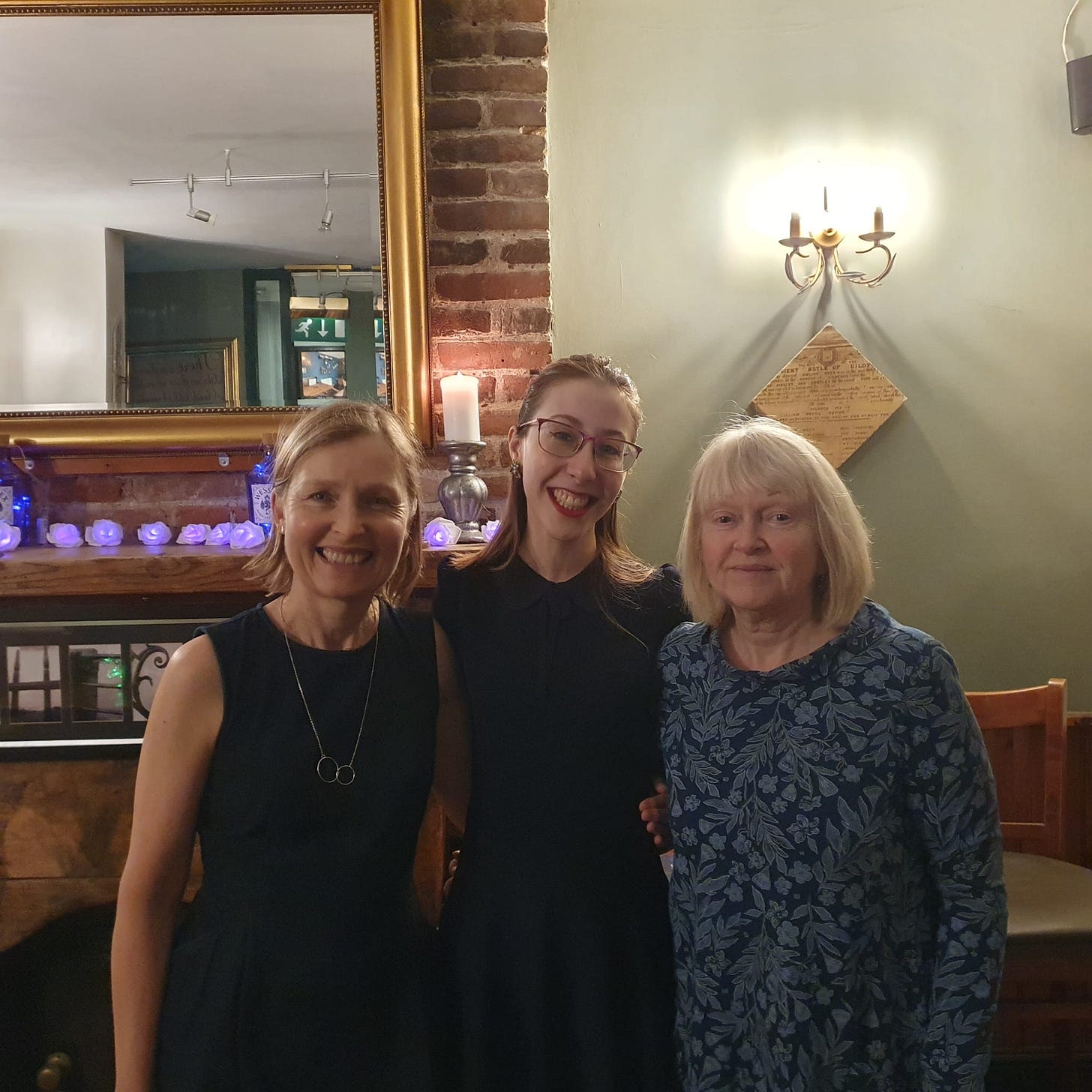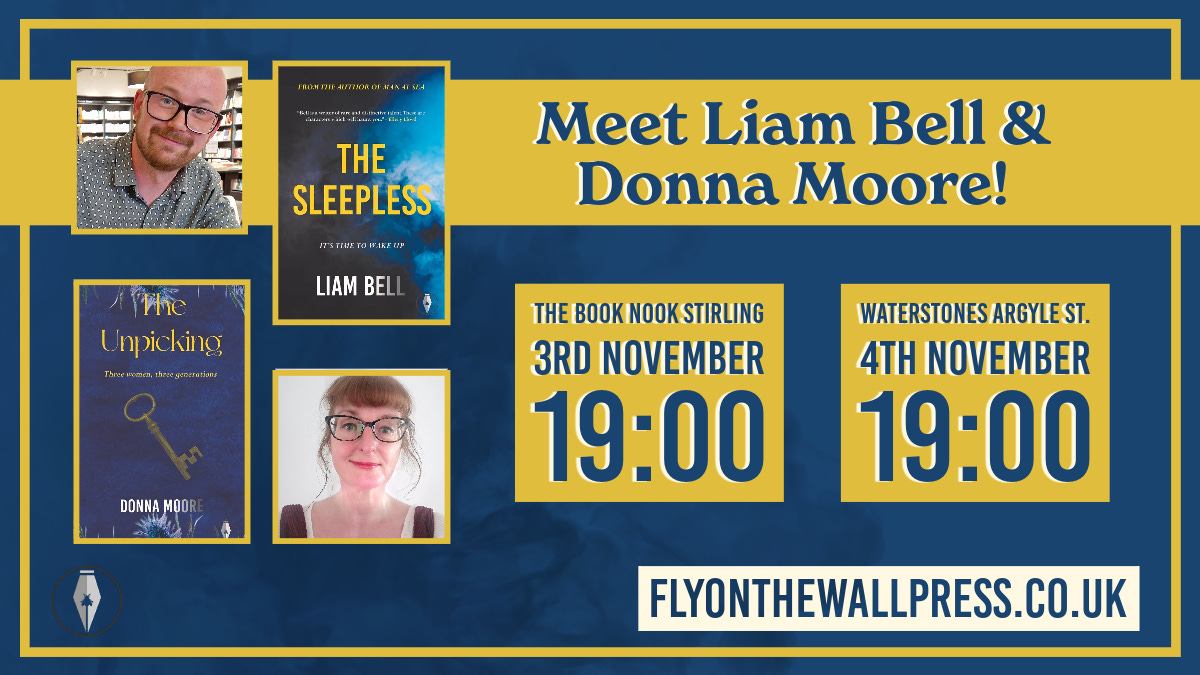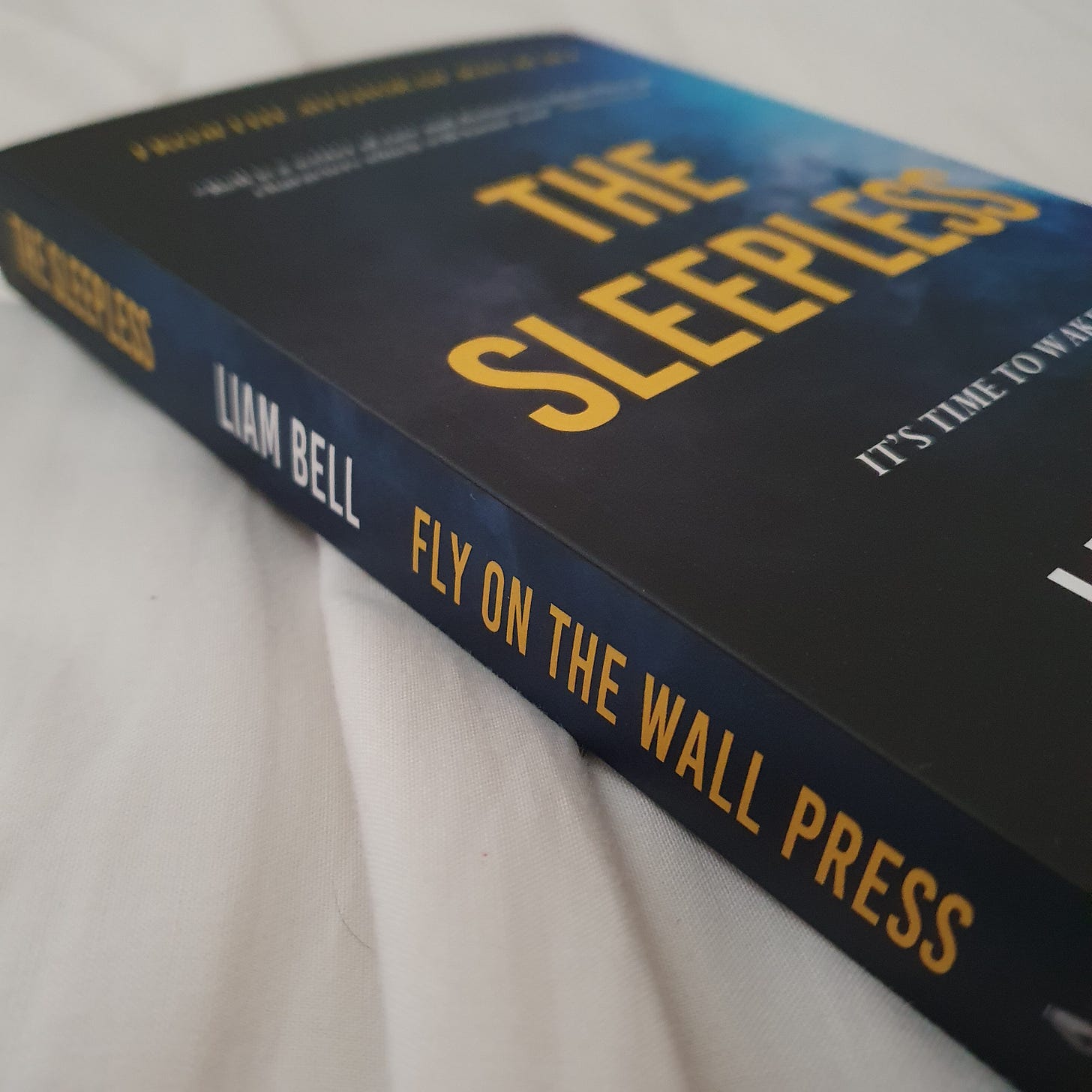"My aim with characters is always to make them authentic rather than likeable."
October Newsletter! From Surrey to Scotland, Fly on the Wall Press is on the road!
Happy Friday Scribblers,
Hello from a very rainy Manchester. This month we’ve had three events! Two online panels for novelists and short fiction writers (poetry panel pending!) and I travelled to Guildford this week for a lovely sold-out launch for ‘The Naming of Moths’ by Tracy Fells and ‘The Truth Has Arms and Legs’ by Alice Fowler at The Keep - a cosy venue which made me feel very Autumnal (dare I say Christmassy?!) It was emotional to see two hard-working authors perform from their debut short fiction collections.
It’s been a really interesting month for me, as I have been chatting with prospective new authors and talking contracts, as well as business strategy with my support network. I’ve realised that, for me, it is essential that an author wants to work specifically with an independent publisher. When a conversation is focused on, ‘what can we achieve with this book together?’ and, ‘what common language can we agree upon for this book; who do we want it to be FOR?’, great things can happen. Publishers and authors do not necessarily speak the same language; one size of publisher does not fit all, and I’m learning the language of ‘no’, walking away from conversations which do not align with me.
This month, we’ve been chatting to Scottish novelist Liam Bell, ahead of our November Stirling and Glasgow tour of psychological thriller, ‘The Sleepless’ and Donna Moore’s historical thriller, ‘The Unpicking’. We hope you enjoy the interview!
‘The Sleepless’ has at its centre a commune who believe that sleep is a social construct and a toxic urge of which they strive to cleanse themselves. What is the reason for your fascination with sleep and how did this translate itself into writing a novel?
The idea for the novel emerged at a time when, with two young kids in the house, we weren’t getting a lot of sleep. And I’d sit in my youngest daughter’s room trying to get her to sleep and think about how much I wanted to go back to bed. Then I started thinking about all those viral videos around productivity and these ‘ideal’ routines which begin with waking up in the wee hours of the morning and it became a fascination. From there, the idea for the cult of the Sleepless was born…
What struck me about this novel when I was reading it was that its setting in Ardnamurchan was very vivid to me, specifically when I imagine cults to be located in places that are far from ‘normal’ life. Why did you decide to keep this novel in the real world rather than positioning the cult in some fantastical otherworld?
One of the crucial facets of cults, for me, is this idea that they are tethered to the real world, that there is a thread back to normal society, except it’s been stretched to breaking point. So, finding a real location that had the isolation for a commune to form and build was really important. Ardnamurchan is somewhere I spent a lot of time as a kid – essentially every summer – so I knew it intimately. It also has some of the most beautiful scenery in Scotland and I liked the juxtaposition between that kind of rugged, elemental landscape and these outlandish ideas.
The methods that the cult members use to stay awake are disturbing and tortuous. Were these methods constructions of your own imagination or did you research into real life cults who have similarly deprived their members of sleep and take inspiration from that?
It was a mixture of the two, really. I did do a lot of reading into various cults and communes, particularly the likes of the People’s Temple and the Branch Davidians, but I was also aware that the methods different groups employ almost always arise from their own teachings, so there was a fair degree of invention too. And, importantly, it struck me that the methods from real life examples of cults always escalated, that there was always a sense of things moving closer to torture as circumstances grew more desperate, so the Sleepless get more gruesomely creative as the novel goes on.
Unconventionally, you write with a perspective on a single dad and the relationship between father and son. Why did you decide to focus on the single, male family perspective?
I wanted the main character, Grafton, to have ties in his life that would pull him away from full immersion in the commune and that sense of responsibility towards his son Isaac becomes a key driving force in the plot. More than that, though, I was also thinking a lot about what it means to be a father during the writing of the novel, because of my own kids, and exploring that through Grafton became really useful and maybe even cathartic (although my own family circumstances are thankfully much calmer and more settled than his!)
Throughout the text, the mother Liz’s abandonment of her family is criticised, however Grafton’s parenting could also be subject to scrutiny: he leaves his son, Isaac, at the age of only 17, with only £20 and an empty fridge, to fend for himself, whilst he investigates the sleepless commune. When you construct a character are you looking to make them likeable or do you aim to build a four-dimensional character, leaving it up to the reader to decide what they think?
My aim with characters is always to make them authentic rather than likeable. None of us are perfect and it’s often through the rough edges of a character that the reader connects with them, I think. So, yes, I’d suggest that the reader’s sympathy for Grafton slides and shifts a bit. Like you say, we judge him for some of his actions through the text and, actually, in doing that I hope our understanding of Liz and her abandonment of her family begins to be reconsidered a bit too…
The relationship that builds between teenager, Isaac, and energetic cult leader Joan is particularly interesting since they are both of similar ages but with very different values and from very different backgrounds. Is there something deeper to the relationship between Isaac and Joan, especially when we consider that after his mother’s abandonment he has not had many intimate relationships (platonic, romantic or otherwise) with women?
Isaac is perhaps my favourite character in the book, to be honest, and it’s partially because of this tricky relationship he has with women. For him, it’s essentially a coming-of-age narrative and he has to try to disentangle his physical attraction to Joan from the teachings she’s espousing and, yes, from his history with his mother too. Teenage love is rarely black-and-white, I’d say, in that it’s often tied in with all kinds of other loyalties, insecurities and sometimes even epiphanies.
Successful businessmen and social media influencers often champion the idea that hyper-productivity comes from being awake for longer, sleeping less. ‘The Sleepless’ really takes this idea to its limits. How far do you believe that the establishment of a cult like the one in your novel is plausible in our contemporary society?
Good question! I started writing the novel back in 2018 and it felt like the concept of ‘alternative truths’ was just taking hold. It seems like the concept for the cult has only grown more plausible in the time since and part of that is definitely a movement towards hyper-productivity. By the same token, I think our collective fascination with that balance between rest and work has much, much deeper roots. I could definitely imagine the Sleepless popping up in an Instagram reel or Tik Tok because what they’re arguing for has just enough logic about it to be appealing…
Blurb:
Grafton is a single dad who works in local radio, but he’s always dreamt of being a ‘real’ journalist. When he gets a whiff of a story – a Scottish commune whose residents believe that sleep is a social construct – he decides to investigate… something tells him ‘the Sleepless’ might finally provide answers about his wife, Liz, who abandoned him and their son Isaac for a similar cult in India.
As Grafton is drawn deeper into the extreme world of the Sleepless, Liz reappears, and Grafton has to race to save both himself and his son…
Grab a copy and read a sample here.
Events
Liam Bell and Donna Moore launch The Sleepless and The Unpicking!
Friday 3rd November 2023
19.00 at The Book Nook, Stirling
Saturday 4th November 2023
19:00 at Waterstones, Glasgow - Argyle Street
Hope you have a lovely weekend Scribblers, next week we will be launching The Unpicking by Donna Moore, three plucky generations of so-called ‘hysterical women’ in Victorian Scotland, and I can’t wait to tell you all about it.
Take care,
Isabelle









